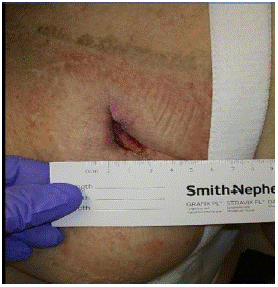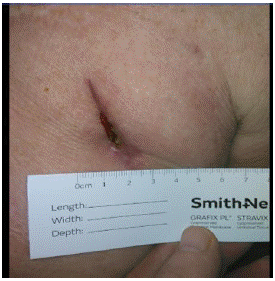
Case Report
Austin Cardio & Cardiovasc Case Rep. 2023; 8(3): 1062.
MSSA Infection Due to Cardiac Device
Ali EA Elkhedr, MD*; Sabri Elkhidir, MD
Department of Internal Medicine, Marshfield Clinic, USA
*Corresponding author: Ali EA Elkhedr Department of Internal Medicine, Marshfield Clinic, 311 West Kalsched Street, Marshfield, Wisconsin, USA. Tel: 715 660 1150 Email: alielkhedr91@gmail.com
Received: September 20, 2023 Accepted: October 13, 2023 Published: October 20, 2023
Abstract
Background: we present a 67-year-old male with a history of coronary artery disease and congestive heart failure. He had undergone implantation of an ICD one year ago. Around a year later, he presented with localized discharge, erythema, and swelling around the ICD pocket site. He denied fever, fatigue, and increased shortness of breath. Infectious disease service performed US guided fluid aspirate and culture which tested positive for MSSA. He started him on prolong regimen of cephalexin for a month without improvement. Recommendations were made then for device removal.
Case Report: After explanation, the patient’s symptoms improved with antibiotic therapy and the wound showed signs of healing. The infection was successfully eradicated, and the patient’s cardiac function stabilized. The patient was discharged on oral antibiotics for an additional four weeks and scheduled for regular follow-up visits.
Conclusion: This case report highlights the occurrence of a cardiac implants pocket infection. Early diagnosis, prompt removal of the infected device, and targeted antibiotic therapy were crucial in achieving successful treatment outcomes. Surgical debridement and wound irrigation played a vital role in preventing further complications. Close monitoring and follow-up are essential to ensure complete resolution of the infection and prevent recurrence.
Keywords: ICD Infection; Infected cardiac implants
Case Report
Introduction
Infection of an Implantable Cardioverter-Defibrillator (ICD) pocket is a serious complication that can lead to significant morbidity and mortality. With the increasing utilization of ICDs for the management of various cardiac conditions, it is important to understand the risk factors, clinical presentation, diagnosis, and management of ICD pocket infections. This case report aims to provide an overview of the current practice surrounding management of ICD pocket infections. A systematic search was conducted in academic databases, including PubMed and Google Scholar, using keywords such as "ICD pocket infection," "implantable cardioverter-defibrillator infection," and "ICD infection management." Relevant studies and articles were reviewed. Several risk factors for the development of ICD pocket infections, including advanced age, diabetes mellitus, immunosuppression, prior device infections, and prolonged hospital stays. The most common pathogens associated with ICD pocket infections are Staphylococcus aureus, including Methicillin-Resistant Strains (MRSA). Clinical presentation can vary, but commonly includes erythema, warmth, pain, and purulent discharge at the site of the ICD pocket. Diagnosis is typically made based on clinical suspicion, supported by blood cultures, wound cultures, and imaging studies such as ultrasound or magnetic resonance imaging. Management strategies for ICD pocket infections involve a combination of surgical interventions, such as device removal and pocket debridement, and antimicrobial therapy, tailored to the identified pathogens and their sensitivities.
Case Presentation
The patient is a 67-year-old male with a history of coronary artery disease and congestive heart failure. He had undergone implantation of an ICD one year ago. Around a year later, he presented with localized discharge, erythema, and swelling around the ICD pocket site. He denied fever, fatigue, and increased shortness of breath. Infectious disease service performed US guided fluid aspirate and culture which tested positive for MSSA. He started him on prolong regimen of cephalexin for a month without improvement. Recommendations were made then for device removal. Despite completing 2 months of iv antibiotics, wound continued to open with now almost partially exposed implant. However, patient denied systemic inflammatory symptoms including fever, weight loss, fatigue, anorexia, or weakness. He is being admitted for device removal. Based on the clinical presentation, the patient was diagnosed with a pacemaker MSSA pocket infection not responding to cephalexin. The patient was admitted to the hospital and started on intravenous antibiotics, including vancomycin and ceftriaxone, to cover both gram-positive and gram-negative organisms. Blood cultures were collected, and an echocardiogram was performed to rule out endocarditis. Treatment involved the removal of the infected ICD system, including the leads and pocket. The patient underwent surgical debridement and irrigation of the pocket, followed by implantation of a new ICD. The removed device system was sent for microbiological analysis and culture. The patient was closely monitored for signs of systemic infection and heart failure. The patient's symptoms improved with antibiotic therapy, and the wound showed signs of healing. The infection was successfully eradicated, and the patient's cardiac function stabilized. The patient was discharged on oral antibiotics for an additional four weeks and scheduled for regular follow-up visits.
Discussion
ICD pocket infections are associated with significant morbidity and mortality, and their management can be challenging. Prevention strategies, including strict adherence to sterile techniques during device implantation and careful patient selection, play a crucial role in reducing the risk of infection. Prompt diagnosis and early initiation of appropriate antimicrobial therapy are vital for successful treatment.
Surgical interventions should be tailored to the individual patient's condition, considering factors such as the extent of infection, presence of hardware complications, and overall clinical stability.

Figure 1: 1 week after device removal.

Figure 2: 4 weeks after device removal.
Multidisciplinary collaboration among cardiologists, infectious disease specialists, and surgeons is essential for optimal management outcomes. As reviewed in previously published articles, infections are mostly staphylococcal in nature [1] with other organisms also being previously identified. The challenge is that most of pathogens are showing antimicrobial resistance, which might make it even harder to eradicate. We were able to confirm a diagnosis with swab culture, however negative results should prompt further invasive steps such as fluid aspirate or even tissue biopsy, those were previously being recommended for higher sensitivity purposes [2]. Complete removal is recommended once diagnosis is made [3].
Conclusion
This case report highlights the occurrence of a cardiac implants pocket infection. Early diagnosis, prompt removal of the infected device, and targeted antibiotic therapy were crucial in achieving successful treatment outcomes. Surgical debridement and wound irrigation played a vital role in preventing further complications. Close monitoring and follow-up are essential to ensure complete resolution of the infection and prevent recurrence.
Author Statements
Acknowledgement
I wanted to take a moment to acknowledge and express my sincere appreciation for the patient for his cooperative attitude towards the team. Her deep understating of the importance of reporting the condition for scientific and educational purposes was crucial for us to continue working on the report. I would like also to express my appreciation for my team worker, my supervisor and Marshfield clinic department of internal medicine and the residency program. I would also express my tributes to my supporting family and who ever put and effort helping or motivating.
References
- Anselmino M, Vinci M, Comoglio C, Rinaldi M, Bongiorni MG, Trevi GP, et al. Bacteriology of infected extracted pacemaker and ICD leads. J Cardiovasc Med (Hagerstown). 2009; 10: 693-8.
- Dy Chua J, Abdul-Karim A, Mawhorter S, Procop GW, Tchou P, Niebauer M, et al. The role of swab and tissue culture in the diagnosis of implantable cardiac device infection. Pacing Clin Electrophysiol. 2005; 28: 1276-81.
- Samuels LE, Samuels FL, Kaufman MS, Morris RJ, Brockman SK. Management of infected implantable cardiac defibrillators. Ann Thorac Surg. 1997; 64: 1702-6.